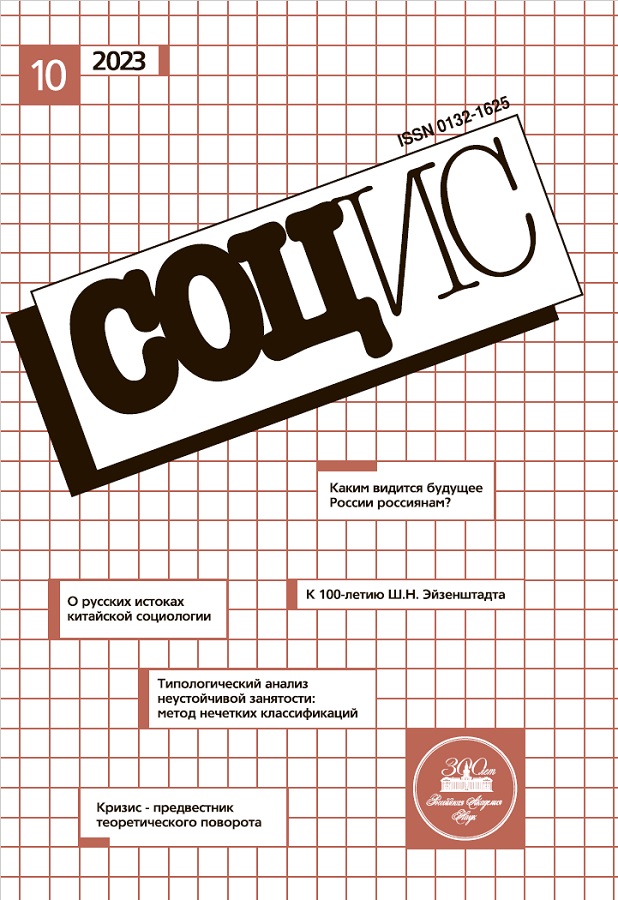Features of Elderly People Perception in Russian Society
- Authors: Lyalikova S.V.1, Nazarova I.B.2, Karpova V.M.3
-
Affiliations:
- Institute of Socio-Economic Problems of Population FCTAS RAS
- Institute of Socio-Economic Studies of Population — Branch of the Federal State Budgetary Scientific Institution Federal Center of Theoretical and Applied Sociology of the Russian Academy of Sciences ISESP FCTAS RAS
- Lomonosov Moscow State University
- Issue: No 10 (2023)
- Pages: 104-115
- Section: Articles
- URL: https://cijournal.ru/0132-1625/article/view/661956
- DOI: https://doi.org/10.31857/S013216250028308-1
- ID: 661956
Cite item
Abstract
The demographic structure of Russian society is undergoing significant changes: the proportion of older people is increasing, the boundaries of the retirement age are shifting, and the structure of the labor market is also changing. The problem is that stereotypes about older people, formed in scientific and public discourse, often have a negative connotation. The purpose of the work is to explore the stable representations of various social groups in relation to older people. Based on the author's empirical research, the paper presents an analysis of the associations that arise with the phrase "elderly person", and also analyzes the degree of agreement and disagreement of the study participants with various judgments about the nature and lifestyle of the elderly. Factor analysis showed which categories of the population are the most loyal and speak positively about the elderly, and which are negatively disposed. Young people show more empathy for the older generation, people of pre-retirement age and the elderly themselves. Negative characteristics of the elderly are attributed to "children" - respondents aged 30-44 years. The core of the consensus in Russian society is represented by the majority, who believe that older people deserve only positive or mostly positive assessments. They see older people as mentors - wise and experienced people who may have squandered some of their physical potential.
About the authors
Sofia Viktorovna Lyalikova
Institute of Socio-Economic Problems of Population FCTAS RAS
ORCID iD: 0000-0002-9043-8158
Russian Federation, Moscow
Inna B. Nazarova
Institute of Socio-Economic Studies of Population — Branch of the Federal State Budgetary Scientific Institution Federal Center of Theoretical and Applied Sociology of the Russian Academy of Sciences ISESP FCTAS RAS
ORCID iD: 0000-0001-8086-1617
Moscow, Russia , Nakhimovsky prospect, 32, 117218
Vera Mikhaylovna Karpova
Lomonosov Moscow State University
ORCID iD: 0000-0003-2560-6140
Russian Federation, Moscow
References
- Блехарская Е.В. Пожилой возраст как переходный этап жизненного пути человека // Педагогическое образование в России. 2017. №12. С. 36–43.
- Ваганова-Наймушина Л.А. Особенности состояния здоровья лиц пожилого возраста и социально-медицинская работа // Вестник Шадринского госпедун-та. 2017. №2 (34). С. 6–12.
- Воронина М.Е. Взрослые дочери и стареющие родители: особенности отношений // Вестник Костромского госун-та. Сер.: Педагогика. Психология. Социокинетика. 2016. №2. С. 84–49.
- Галкин К. А. Активность и стратегии заботы о здоровье пожилых людей: городской и сельский контекст // Наука. Культура. Общество. 2023а. Т. 29. № 1. С. 130–142. doi: 10.19181/nko.2023.29.1.10.
- Галкин К.А. Особенности медикализирующего поведения в отношении пожилых людей при взаимодействиях с врачами и социальными работниками // Гуманитарий Юга России. 2023б. Т. 12. № 2. С. 14–27. doi: 10.18522/2227-8656.2023.2.1.
- Григорьева И.А., Уханова Ю.В., Смолева Е.О. Трансформация социальной политики в России в контексте старения населения // Экономические и социальные перемены: факты, тенденции, прогноз. 2019. Т. 12. № 5. С. 124–140. doi: 10.15838/esc.2019.5.65.8.
- Дмитриев А.В. Социальные проблемы пожилых людей // Социальная защита. 2011. №9. С. ???
- Дорлинг Д., Гител-Бастен С. Почему важна демография / Пер. с англ. А. Писарева; под науч. ред. Э. Сафронова. М.: ВШЭ, 2022.
- Касьянова Т.И., Воронина Л.И., Резер Т.М. Образовательный потенциал российских граждан пожилого возраста // Образование и наука. 2020. № 22(2). С.121–142.
- Козырева П. М., Смирнов А. И. Социальная изоляция и одиночество в пожилом возрасте // Социологическая наука и социальная практика. 2022. Т. 10. № 4. С. 46–63.
- Корнилова М.В. Компьютерные и интернет-технологии в жизни пожилых людей: возможности и риски // Власть. 2018. № 6(26). С. 62–69.
- Кучмаева О.В. Социальная активность пожилых россиян и перспективы реализации политики «активного старения» // Население и экономика. 2018. Т. 2. № 4. С. 47–84.
- Липпман У. Общественное мнение / Пер. с англ. Т.В. Барчунова; под ред. К.А. Левинсона, К.В. Петренко. М.: ФОМ, 2004.
- Медков В.М. Демография. М.: Инфра-М, 2008.
- Осипов Г.В. (ред.) Энциклопедический социологический словарь. М.: ИСПИ РАН, 1995.
- Павлова И.А., Недоспасова О.П., Барышева Г.А. Комплексная оценка социально-экономической вовлеченности граждан старшего поколения в региональный социум на примере трудовой активности // Векторы благополучия: экономика и социум. 2020. № 4(39). С. 48–84. doi: 10.18799/26584956/2020/4(39)/1060.
- Прохорова Л.В. Пожилые люди и "серебряное" волонтерство: реальные кейсы // Вестник НГУЭУ. 2019. № 3. С. 248–259. doi: 10.34020/2073-6495-2019-3-248-259.
- Трубицына Л.В., Журавлева Ю.В. Психологические особенности отношения взрослых людей к своим родителям // Психолог. 2022. №6. С. 88–97. doi: 10.25136/2409-8701.2022.6.39542.
- Шмерлина И. А. Возрастные конструкты и стиль жизни в старшем возрасте. Часть II. Точка отсчета старости и построение жизни на зрелых этапах // Мониторинг общественного мнения: экономические и социальные перемены. 2014. № 2(120). С. 190–198. doi: 10.14515/monitoring.2014.1.013.
- Ashmore R.D., Del Boca F.K. Conceptual Approaches to Stereotypes and Stereotyping. Cognitive Processes in Stereotyping and Intergroup Behavior/ edited by D.L. Hamilton. New York: Lawrence Erlbaum Associates, 1981. P. 1–35.
- Pitchford S.R. Image-making movements: Welsh nationalism and stereotype transformation // Sociological Perspectives. Vol. 44 (1). 2001. P. 45–65.
- Tajfel H., Jahoda G., Nemeth C., Rim Y., Johnson N. The Devaluation by Children of Their Own National and Ethnic Group: Two Case Studies // British Journal of Social and Clinical Psychology. Vol.11 (3). 1972. P. 235–243.
Supplementary files










